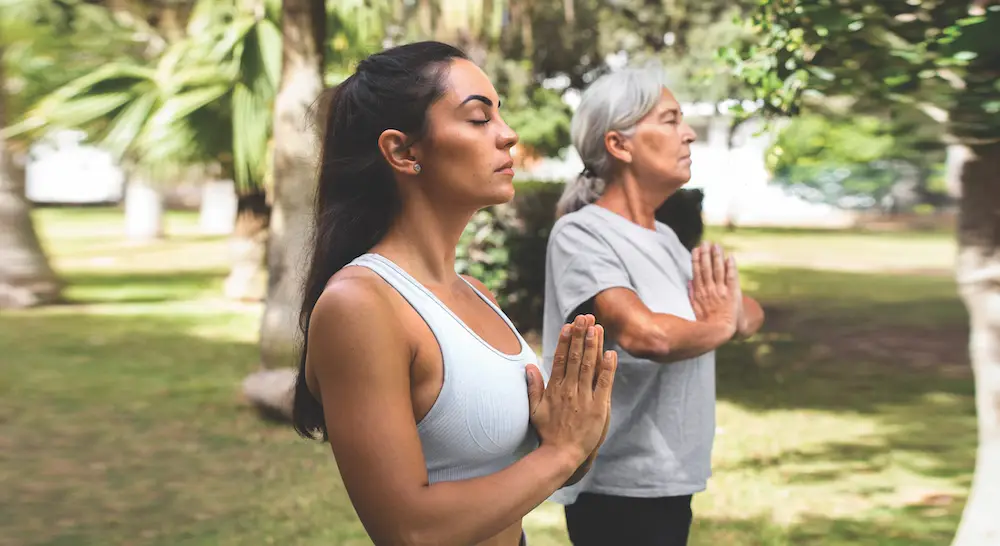News & Articles

5 Breathing Techniques For Lung Strength and Stress Relief

Breathing is a natural and instinctive process; we all do it subconsciously everyday. There are, however, various breathing techniques that could aid in your overall lung health, relieve stress, and more. Here are 5 simple breathing techniques you can try at home.
From the moment we take our first breath as a newborn, breathing becomes a natural part of our life and we often pay no heed to it. However, there are several simple breathing techniques that you can adopt to improve oxygen exchange and relieve stress. Breathing exercises are known to increase lung capacity and help people control their breathing1.
When our normal breathing process is impaired, this means that we are unable to fully allow the exchange of oxygen and carbon dioxide in our lungs. If this continues, stale air can build up, leaving less room for the diaphragm to contract and bring in fresh oxygen. If the diaphragm is not working at full capacity, the body will start to use other accessory muscles in the neck, chest, and back for breathing2. This may lead to lower oxygen saturation levels in the body which may have several detrimental health effects.
On the contrary, by practising good breathing techniques, one can achieve better health outcomes, such as an improved pulmonary function, inspiratory muscle strength3, and increase oxygen saturation levels in your body4.
Breathing exercises may also help individuals manage the symptoms of the following health conditions:
- Asthma
- Chronic bronchitis
- COVID-19
- Chronic Obstructive Pulmonary Disease (COPD)
- Flu
- Emphysema
- Obesity
- Lung cancer
- Pneumonia
- Pulmonary embolism
Here are 5 simple breathing techniques that you can practise in the comforts of your home to strengthen your lungs and wash your worries away:
- Deep breathing
Deep breathing can alleviate breathlessness by preventing air from getting trapped in the lungs and facilitating the intake of fresh air deep into the base of the lungs. This practice may help individuals to relax and feel grounded.
- While standing or sitting, draw your elbows back slightly to allow your chest to expand.
- Inhale deeply through your nose.
- Hold your breath for 5 seconds.
- Slowly release your breath by exhaling through your nose.
- Diaphragmatic breathing
Diaphragmatic breathing, also known as abdominal breathing or belly breathing, is a breathing technique that encourages full oxygen exchange, which is the beneficial trade of incoming oxygen for outgoing carbon dioxide. Expectedly, this can help reduce the pace of your heartbeat and stabilise or lower your blood pressure5.
- Lie on your back with your knees bent. You may place a pillow under your head and your knees for support.
- Place one hand on your upper chest and the other on your belly, just below your rib cage.
- Breathe in slowly through your nose. The hand on your chest should remain still, while the one on your belly should rise.
- Exhale through pursed lips. Tighten your abdominal muscles and let them fall inward as you do so. The hand on your belly should revert to its original position.
Once you are comfortable with this technique, you can practise it while sitting on a chair with your knees bent and your head, neck, and shoulders relaxed.
- Pursed lip breathing
Pursed lip breathing is a breathing technique that aims to reduce the number of breaths you take and keep your airways open for a longer period of time6. This will relieve you of shortness of breath, decrease the work of breathing, and improve gas exchange7. It can also help you to gain a sense of control over your breathing and increase your relaxation.
- Inhale through your nose for 4 seconds.
- Hold a piece of tissue paper in front of your lips.
- Blow gently into it for 8 seconds.
- Box breathing
Box breathing is a breathing technique that helps individuals alleviate stress and can be implemented before, during, and after stressful experiences. The technique involves visualising a journey around the four sides of a square, with each side dictating an action.
- Sit with your back straight. Breathe in through your nose for 4 seconds.
- Hold your breath for 4 seconds.
- Breathe out for 4 seconds.
- Hold your breath for 4 seconds.
- Cardiac coherence breathing
Cardiac coherence breathing is a breathing technique that aims to regulate your heart rate and synchronise the activity of the sympathetic and parasympathetic nervous systems8. This technique is often used as a relaxation and stress reduction method, with the goal of achieving a physiological and mental balance.
This technique relies on a 365 structure, where one should aim to practise it 3 times a day and complete 6 breathing cycles per minute for a total of 5 minutes.
- Sit with your back straight. Inhale through your nose for 5 seconds.
- Exhale through your mouth for 5 seconds with pursed lips.
- Repeat this cycle for 5 minutes. You should complete 30 breathing cycles in total.
Breathe deeper, live better
Breathing techniques offer a holistic approach to well-being, addressing both the physiological and psychological aspects of health. Whether you're seeking stress relief, better lung health, or emotional balance, these techniques can be powerful tools to include in your self-care toolkit. Remember that individual experiences may vary, so it is important to explore various techniques and find what works best for you.
Consult a healthcare professional if you have any concerns about incorporating new practices into your routine, especially if you have pre-existing medical conditions.
| POSTED IN | Exercise |
| TAGS | cancer & exercise, lung cancer, stress and cancer |
| READ MORE ABOUT | Lung Cancer |
| PUBLISHED | 01 November 2023 |
